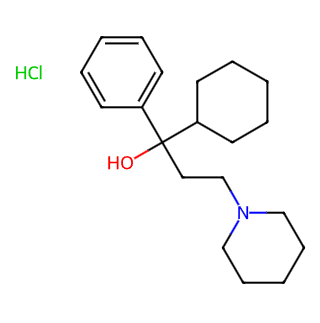- Synthetic anti-infective drugs
- Medications for the digestive system
- Antipyretic and analgesic drugs
- Medications for the blood system
- Medications for the respiratory system
- Anti-allergic drugs
- Medications for the urinary system
- Diagnostic medications
- Immunosuppressive and immunomodulatory drugs
- Vitamins and mineral supplements
- Antioxidants and medications for osteoporosis
- Antiparasitic drugs
- Ophthalmic medications
- Amino acids and their derivatives
- Dermatological medications
- Medications for the circulatory system
- Antitumor drugs
- Medications for the nervous system
- Hormonal and endocrine function-regulating drugs
- Antibiotics
- Others
CAS No.: 52-49-3




Benzhexol Hydrochloride
Basic Information
English Name: Benzhexol Hydrochloride (also known as Trihexyphenidyl Hydrochloride)
CAS Number: 52-49-3
Molecular Formula: C20H31NO•HCl
Molecular Weight: 337.93 g/mol
Pharmacological Actions
Benzhexol Hydrochloride, commonly known by the trade name Artane, is an antiparkinsonian agent with significant antimuscarinic activities. It is primarily used to alleviate symptoms of Parkinson's disease as well as drug-induced extrapyramidal reactions.
1. Antimuscarinic Action:
o Benzhexol works by blocking central cholinergic receptors, reducing the effects of acetylcholine, which helps to restore the balance between acetylcholine and dopamine in the brain. This balance is often disrupted in Parkinson's disease and other extrapyramidal disorders.
2. Parkinson's Disease Management:
o It decreases muscle rigidity, reduces tremors, and has a moderate effect on dyskinesias, which are involuntary movements. The drug is believed to provide symptomatic relief that can assist in improving daily function and mobility.
3. Adjunct Therapy:
o Benzhexol is often used in combination with other antiparkinsonian drugs like levodopa or dopamine agonists to enhance overall management of Parkinson's disease.
4. Extrapyramidal Symptoms (EPS):
o The drug is effective in treating EPS such as dystonia, akathisia, and other movement disorders often caused by antipsychotic medications. By counteracting the cholinergic system, Benzhexol can help mitigate these side effects, allowing continued use of necessary antipsychotic therapy.
5. Mechanism of Action:
o Benzhexol selectively blocks muscarinic receptors in the CNS, particularly M1 receptors, which play a crucial role in motor control. The exact mechanism is due to competitive antagonism at these receptor sites, reducing cholinergic activity and thereby balancing dopaminergic activity.

Tai Yau Street, San Po Kong, Kowloon, Hong Kong, China.



